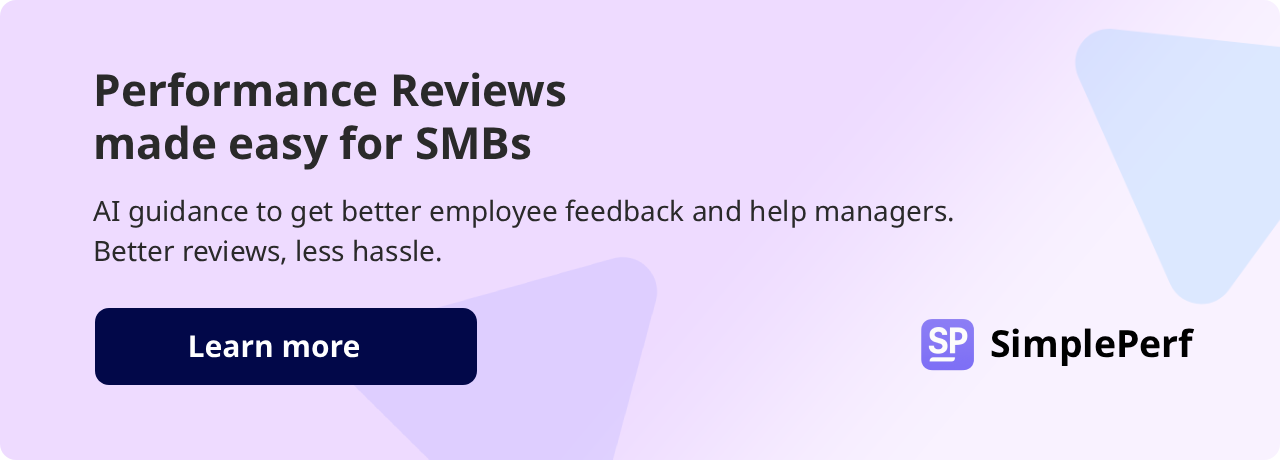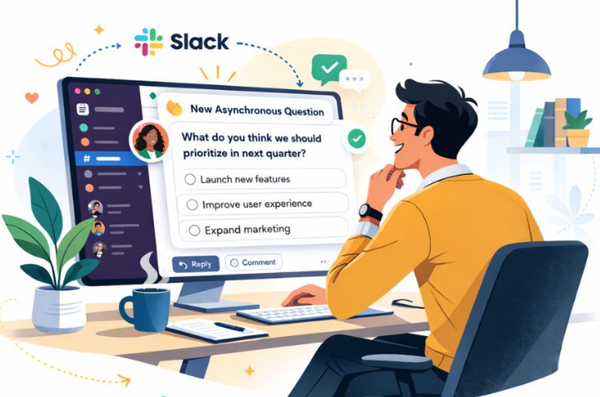6 Questions to ask in your performance review: Manager edition
We'll go through good questions to ask as a manager during performance reviews. Find the best questions to ask to employees.


Tired of asking, ‘How do you think you’ve been performing this year?’ during the annual performance review. Sure, starting the conversation is okay, but it rarely elicits the kind of feedback you’re hoping to get.
When you’ve only got 30-45 minutes to inspire, offer constructive feedback, and get a good idea about what’s going on in your direct report’s head, you need powerful questions to move the review process along.
We have a few ‘go-to’ questions that have worked over the years, and now we will share them with you. Get real insights, keep the dialogue flowing, and even enjoy the conversation with the best performance review questions for 2025.
Looking for a simple performance review software?
Checkout SimplePerf! Made for small teams and first-timers, SimplePerf is a simple 360 performance review software. Built for HRs, Loved by managers.
1. What are you most proud of accomplishing this review period?
This question sets a positive tone from the start and takes a bit of pressure off your employee to develop a list of achievements. It gives them a moment to catch their breath and reflect on something that is personal to them.
Posing this question also allows you to show interest in how the employee sees their professional growth. Often, managers come with preconceived ideas about what’s important to their team and miss what’s really going on.
Take your cue from a recent TikTok trend called, ‘We listen and we don’t judge’. During this trend, two people made statements about their lives while the other person merely listened and didn’t judge the statement or the person. This encourages a safe space where your employee can be heard without condemnation.
Key skills are needed to execute this question: Active listening, non-judgmental, and emotional intelligence.
If you need to gather data organically for your performance review meeting, why not use the BuddiesHR Performance Management app in Slack?. With BuddiesHR, you’ll have the evidence you need from peer reviews, 360-degree assessments, and surveys to confirm what your employee is saying.
What to do if this question goes wrong
If your employee really struggles to answer this question, they could be unsure of themselves or of your expectations. Try nudging them with: “Why don’t you think back to a moment when you felt ‘I really did that well!’” Don’t accept answers like, ‘I don’t know’. This could signal that they don't place enough value on their career goals or professional development.
2. What was really challenging for you this past year, and how did you handle it?
This question uncovers the employee's self-awareness and accurate evaluation of their weaknesses. You will also discover the level of their problem-solving skills, and whether they know where to get support when needed - valuable information indeed.
Challenges can be about anything. Common ones are about interpersonal conflict, workflow bottlenecks, work overload, and a lack of skills. This question often yields the best results for career growth and provides a starting point for the next performance review meeting.
Key skills needed to execute this question: Empathy, problem-solving facilitation, and non-defensive listening.
What to do if this question goes wrong
One-on-one meetings are best for dealing with challenges, but even so the employee may not want to admit mistakes or weaknesses. Hardly anyone avoids friction between review cycles, so if the employee has nothing to say, help them to reframe the question by saying: ‘Was there anything that slowed you down, or temporarily caused a bump in the road?’.
You can also explain how employee development is about honest reflection.
3. Looking back over the last few months, where do you feel you had continuous improvement?
This question sheds light on skill-building that is not necessarily tracked by performance indicators, but if the employee can provide specific examples, this will make the conversation richer. Your employees should assess their own progress in relation to the company’s mission, their most important goals, leadership skills, and employee satisfaction.
Key skills needed to execute this question: Ability to recognize growth and promotion opportunities, open communication, and a future mindset.
What to do if this question goes wrong
A recognition of continuous growth requires the ability to see small steps to success and acknowledge them for what they are. Some employees are so focused on long-term performance goals being met, that they don’t see that progress has been sure and steady.
This leads to feelings of frustration, and can be expressed as, ‘I don’t feel like I’ve made much progress this review period’. Provide subtle prompts as to where you’ve seen progress, this will help get the conversation going.
4. What skills would help you achieve success in your job?
At this point, the performance review becomes future-focused. Most employees think about what they need to do well in their jobs, and review time is the perfect opportunity to talk about the skills they need to do really well in their jobs.
As a manager, you need to know whether your employee’s skills have organizational alignment, i.e, do their skills directly tie in with what the organization requires of them? Doing it this way is more likely to help them achieve personal success.
Key skills needed to execute this question: Observation, growth mindset, constructive criticism, and coaching.
What to do if this question goes wrong
As you enter these conversations, you already know what you want to discuss regarding your employee's skills, including pain points and growth areas. These areas will be much better received if they can identify the skills they need for success before you mention them.
Give them a chance, and prompt them with a scenario like: ‘If you can imagine a time when you’re consistently exceeding performance expectations, how did you get there?’

5. Where did you personally have the most impact this review period?
This can seem like a hard question at first glance, but it's a great opportunity for your employee to get to grips with whether their performance made an impact, and if they can see the impact they’ve made, they feel more engaged.
There’s something deeply motivating about contributing positively to the efforts or lives of others and being recognized for doing it. Where the employee feels they have made a huge impact, it is vital that you affirm their statements, especially if you have seen the effect on the team for yourself.
Key skills needed to execute this question: Affirmation, coaching, encouraging feedback, and insight into team contribution.
What to do if this question goes wrong
If your employee really struggles with this one, ask: ‘When did someone else thank you for helping them, or making their job easier?’.
Sometimes people overlook what they consider to be ‘soft impacts’, like relationship building, or being an integral part of team morale, or always being open to feedback and improvement.
6. How can I support you in your position?
Whatever questions you choose to ask, end with this one.
The focus of the review meeting up to this point has been on the employee, performance, impact, and providing feedback. Now it's your turn.
As a manager, you have access to resources and crucial skills that your employee may need. This can include coaching, mentorship, training, and increased responsibilities. They may have a promotion on their mind, in which case, they value your acknowledgement of their hard work and your support.
Key skills needed to execute this question: Coaching, mentorship, servant leadership, open communication.
What to do if this question goes wrong
If they say, ‘Nothing, I’m fine.’ or ‘I don’t think there’s anything’, it may be a sign that they don’t want to ask for help, or are not aware of what kind of support you can give them.
In this case, say: ‘If you think about what can make you more successful, or your work easier, does it involve my participation?’
Key Takeaways: Best performance review questions
Our top 6 questions to ask in your performance review are not just about prompts. These are powerful, pointed, and in-depth questions that get to the heart of employee engagement and satisfaction.
The information you’ll take away from the review meeting will provide you with the key actions needed from you in the next 3, 6, and 9 months. In summary, ask:
1. What are you most proud of accomplishing this review period?
2. Looking back over the last few months, where do you feel you had continuous improvement
3. What skills would help you achieve success in your job?
4. Where did you personally have the most impact this review period?
5. What was really challenging for you this past year, and how did you handle it?
6. How can I support you in your position?
That’s it! Another year of review meetings successfully wrapped up, and this time you’ll be smiling from ear to ear.
Further helpful information: Why Are Performance Reviews Important + 3 Tips To Improve Them





